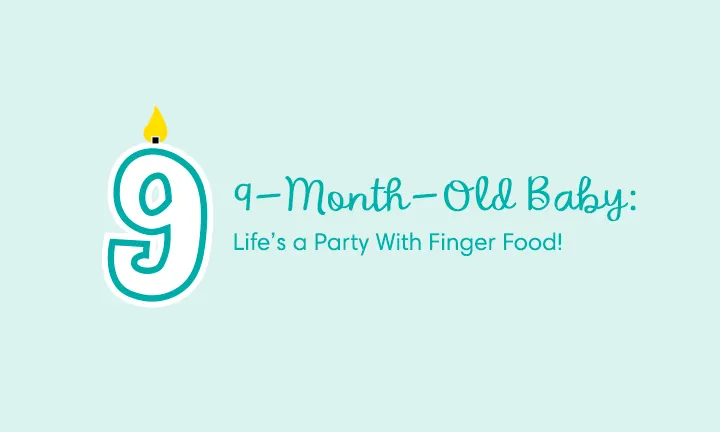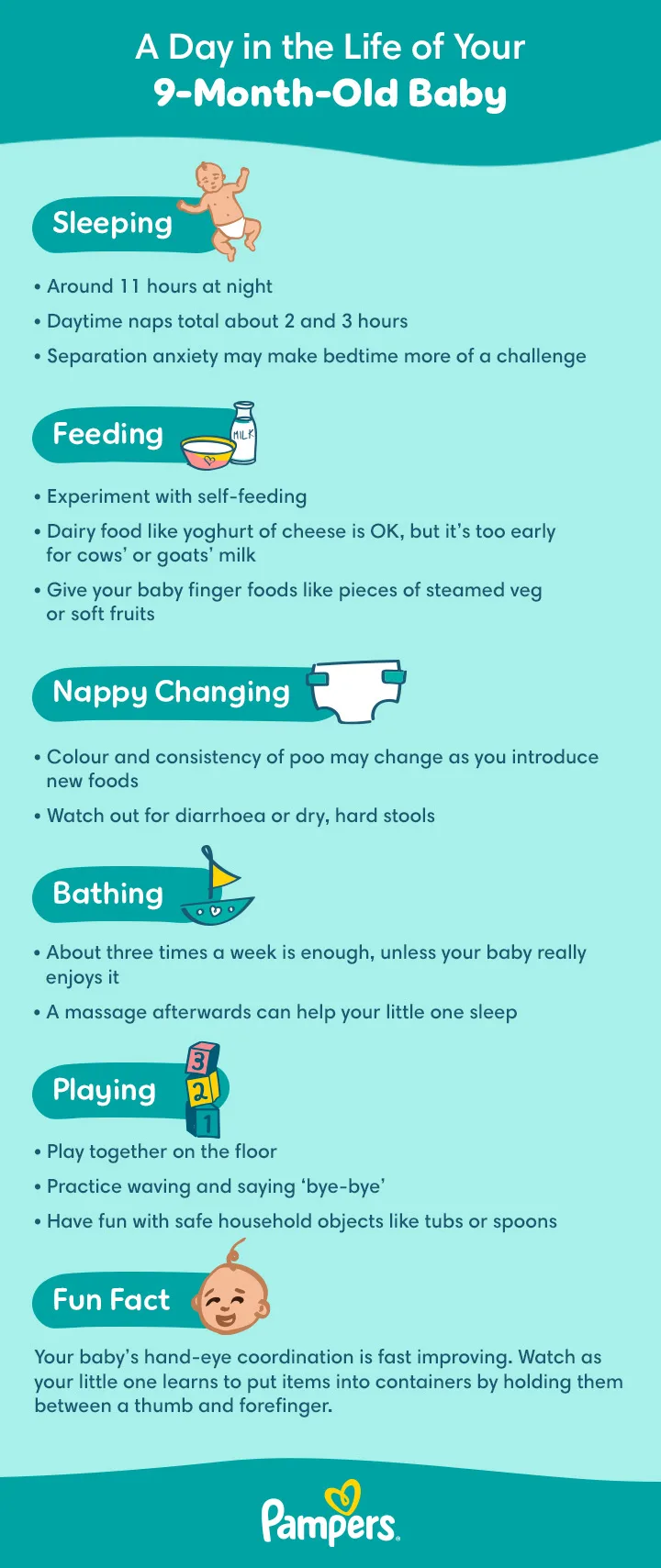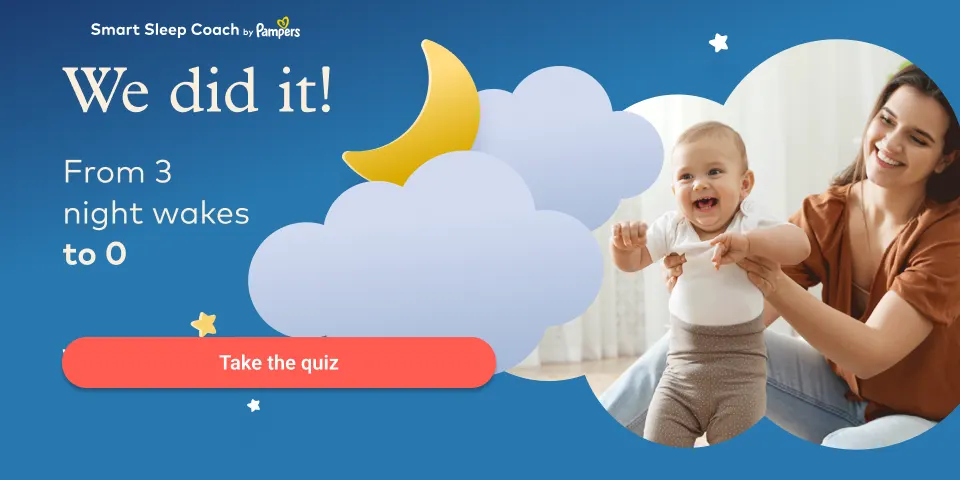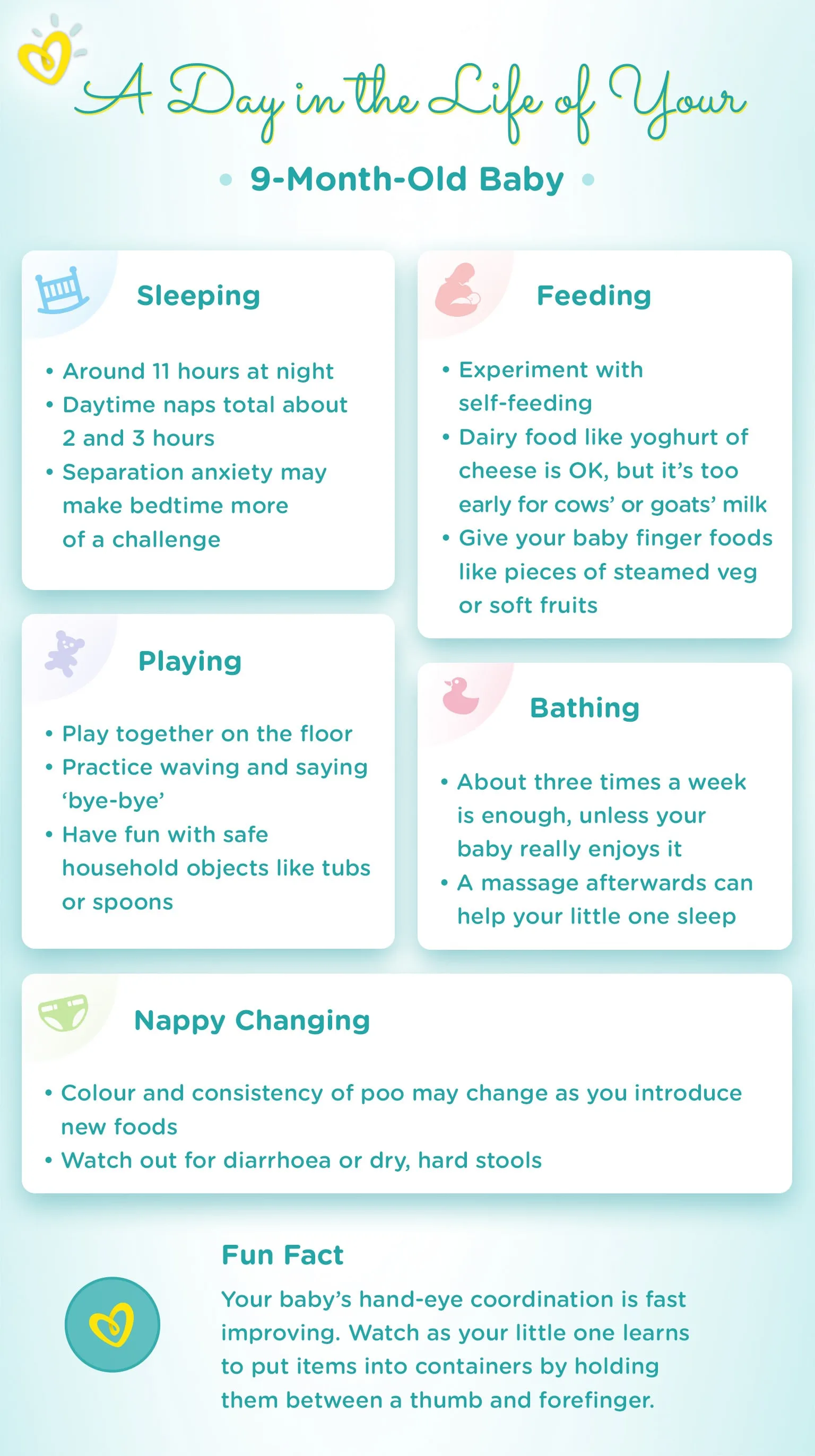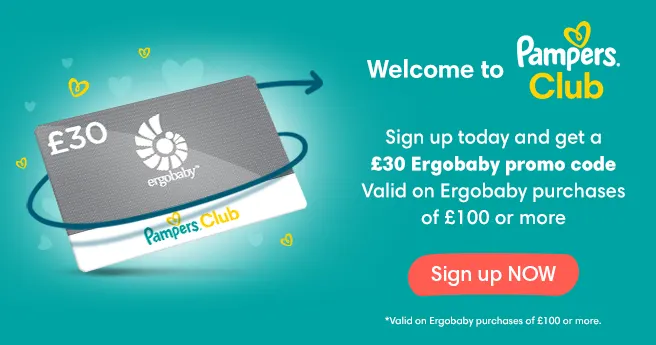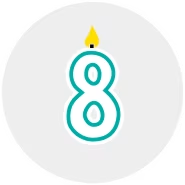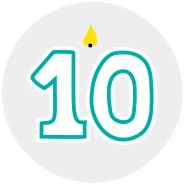9-Month-Old-Baby: Life’s a Party With Finger Food!
Your baby is getting more and more mobile, perhaps even crawling by now — and it’s no surprise that you couldn’t be more proud of the progress your little one is making. There are so many things happening this month, including some great improvements in your baby’s cognitive skills and mobility. Read on to find out more about the development milestones to look out for when it comes to your 9-month-old baby, and the kinds of eating and sleeping habits you might experience at this stage.

Baby Development Milestones
By this stage you know exactly how much your baby enjoys playtime – especially if it’s with you! And you’ve seen how much your little one is growing and changing. There is no hard and fast rule about what a 9-month-old baby should be doing at this stage, but these are some of the development milestones you might be noticing around this time:
Growth and Physical Development: Ready for a Review
All babies grow at their own rate. At your next healthcare visit, your baby’s health visitor, child centre or GP will track your 9-month-old baby’s development. Among other things, language and learning, safety, diet and behaviour are reviewed at this time.
Movement: Picking Up New Experiences!
Your baby may now be crawling, bottom-shuffling or slithering on his or her tummy. Keep in mind that some babies skip crawling altogether, while others master it a little later on.
Another new skill that your little one might be learning right about now is pulling him or herself upright using furniture.
Your baby’s hand and finger skills are also coming along. For example, he or she has probably mastered the raking grasp, meaning that your little one is able to reach out and pull objects toward him or herself.
Next, your baby will be working on developing what’s called the pincer grasp – the ability to pick up and hold things between the thumb and forefinger. Your little one probably isn’t quite there yet, but is gaining better control of her fingers and hands as he or she picks things up, shakes, bangs, drops and throws them.
This month your baby might already be able to use fingers to point to things, and do some more hand gestures such as clapping and waving.
Cognitive Development: Life’s Simple Pleasures
Your baby has a very short attention span and may only be interested in playing with a toy for a couple of minutes before wanting the next fascinating object. You don’t need to buy brand-new toys for your 9-month-old baby, though. He or she’s just as happy with basic household items like a wooden spoon or an ice cube tray. Letting your little one play with these objects is a great way to involve him or her in your daily activities, including cooking and housework.
A ‘Treasure Basket’ is another excellent way to support your baby’s exploration. A Treasure Basket is a container you can fill with different everyday objects that look or feel interesting and are safe. There’s no special purpose to any of them, apart from sparking curiosity and keeping your little one occupied.
You may also have noticed that your baby’s slowly beginning to understand that things are still there even when they’re out of sight. For example, your little one can watch you hide a toy, and then find it without any help.
By this month, he or she can also understand and respond to simple phrases like ‘no’, ‘bye-bye’, ‘bath time’ and ‘dinner’, especially in the context of a familiar routine.

How to Support Your Baby's Development
Here are some tips and strategies for promoting your baby's healthy growth and development this month:
Spend time on the floor playing with your baby. If your baby is already crawling, let him or her crawl around on the floor, but make sure it's safe first by removing everything that can present a choking hazard, has sharp edges or may be poisonous.
Don’t use baby bouncers and baby walkers, as these can delay your baby’s ability to learn to pull him or herself up to a standing position.
Help your baby improve those finger skills by giving him or her safe toys with moving parts that change as they are handled. Ideas include toys that stack like building blocks; floating, squeezable bath toys like a rubber duck; or push-pull toys like a little wooden train.

Feeding Your 9-Month-Old Baby
By now, your baby probably enjoys a whole variety of mashed and finger foods. Here’s an example of a daily menu for your 9-month-old including both baby food and breast milk or formula. It also gives you an idea of approximately how much baby food to give your 9-month-old.
Vitamins are the building blocks of nutrition. Your little one needs vitamin A for growth and skin health, vitamin C for tissue health and vitamin D for strong bones and teeth. Though your baby can get part of his or her vitamin requirement from food, supplementation is highly recommended.
You can check here if you’re eligible for free Healthy Start vitamin drops that contain all three of these vitamins. Alternatively, your GP can advise which supplement is best for your baby.

How Much Sleep Does a 9-Month-Old Baby Need?
Nine-month-old babies typically need about 11 hours 30 minutes of sleep at night, and about two hours 45 minutes sleep during the day. By this stage your baby probably won’t be needing a middle-of-the-night feed, but may wake up at night if he or she feels anxious about where you are. If you hear your little one cry, go over and reassure him or her that all is well.
Of course, you should always check that your baby is comfortable and not sick, but if everything seems OK, resist taking him or her to your bed or turning on the light. The key is to calmly and consistently reassure your little one that you’ll be there if he or she needs you, slowly teaching your baby that he or she can sleep peacefully without worrying that you’re not there.

A Day in the Life of Your Baby
A typical 9-month-old baby’s daily schedule could include sleeping, feeding, bathing, and playing. Here’s just one example of what a day in your baby’s life might look like:

Your Baby’s Health: Tips for Fun in the Sun
Sun protection is crucial for your baby’s skin. In the warmer months it’s natural to want to go outside with your baby, but too much time in the sun can damage skin. In fact, harmful UV rays can cause damage even in the cooler months, so these sun protection tips are important to follow year-round:
Aim to keep your baby out of direct sunlight between 11 a.m. and 3 p.m., when the sun is at its strongest.
Dress your baby in lightweight cotton clothes that cover much of his or her skin. Think long sleeves and long trousers.
Use a beach umbrella as shade when playing outside and pull the shade cover down on the pushchair during walks.
Pop a wide-brimmed hat on your baby.
Put sunglasses on your baby to protect her eyes. Just make sure they meet the British Standard and carry the CE mark.
Apply a broad-spectrum sunscreen with SPF 15 or higher on your baby's skin about half an hour before you head outside. Reapply it at least every two hours.
If your baby does get sunburned, help ease the discomfort by placing a cool washcloth on the affected area and then by moisturising the skin. Burns that blister may need medical attention, so ask your health visitor, child centre or GP for advice.
Along with sun protection and skin care, other common health concerns you might want to know about now or in the future include whooping cough and middle ear infections.
Whooping cough. Also known as pertussis, whooping cough is a bacterial infection that results in inflamed airways. It causes severe coughing that may have a ‘whooping’ sound. Babies in their first year are at the greatest risk of whooping cough developing into something more severe, so prompt medical care is required. This is why you should see your GP right away if you suspect your baby has whooping cough. The infection is usually treated with antibiotics. Keep in mind it may be a few weeks or even months before your baby’s cough clears.
Ear infections. These are common in babies, and they are mostly caused by viruses. Ear infections typically clear up in about three days. Your baby might pull or rub at an ear, have trouble sleeping or develop a fever. You can give your little one paracetamol or ibuprofen to relieve the symptoms, but you should also ask your GP for expert advice. An ear infection can cause temporary hearing loss. If your baby’s hearing doesn’t improve within a few weeks, consult your GP again.

FAQs at a Glance
Sitting on the floor with your baby and rolling a ball together, letting your little one look at him or herself in a childproof mirror and making faces together, as well as playing ‘peekaboo’ are all great ways to entertain your little one and help improve his or her newfound skills.

Your Life as a Parent: How to Plan a Baby-Friendly Vacation
Are you thinking about a family trip? You might feel anxious about traveling with your baby, but it is completely doable — and lots of fun! Here are some tips to make your trip a success:
Choose a destination that's relaxing and safe, so you feel less overwhelmed. It may help to go somewhere you’ve been before and feel comfortable with.
Plan ahead and take into account the weather, travel times and time zone changes.
If travelling abroad, make sure your baby has a passport.
If you’re going on a plane, read this article on flying with a baby for great tips.
Check whether your baby will need any vaccinations. Your baby may need to get these vaccines several weeks before traveling, so check with your GP nice and early.
Make a list of essential items such as your baby’s favourite toy, car seat, travel cot and first aid kit. Have extras of things like clothes, nappies, snacks, and water. Also, take our quiz to see how well you know what to pack in your nappy bag.
Pack lots of baby wipes. They’re useful for cleaning hands and cheeks, as well as cleaning public places where you may want to change your baby.
Don’t create a jam-packed itinerary. Instead, add lots of down time to your plans.
When you’re away, try to mimic home in the ways you can. For example, perhaps follow a similar daily routine or take your baby’s favourite toy to give him comfort.
Even though it’s easier said than done, try to stay calm. If you take on an easy-going attitude and you’re having a good time, your baby will be more likely to do the same.
Checklist for This Month
If you haven’t already, schedule your 9-month-old baby’s health review. At this visit your health visitor, child centre or GP will check that your baby is eating and sleeping well and meeting growth and development milestones. Important information will be recorded in your baby’s red book. They will also send you a questionnaire, known as the Ages and Stages Questionnaire or ASQ-3 that you should fill in before the review to help your health visitor understand your baby’s development. Use this opportunity to ask any questions you have and get advice, if you need it.
Secure the furniture. Right about now or during the next few months, your baby will start to pull himself up to stand and use furniture for support. Before your baby gets going, secure furniture to the wall or remove any furniture that might topple over. Read more about how to baby-proof your home.
Start looking ahead. Check out what kinds of things may happen when your baby is 10 months old.
For even more information, sign up to get our regular emails:
9 month old baby - checklist
